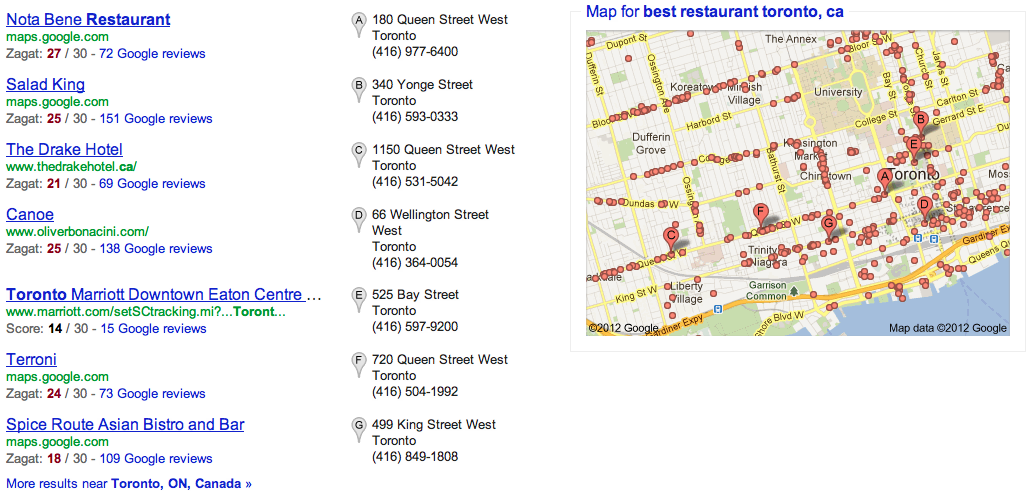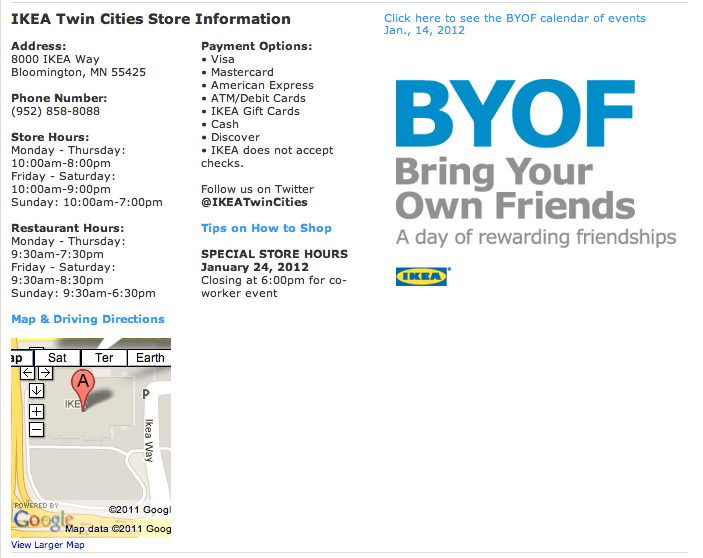The local organic search results are one of the best marketing sources to obtain lead-generating search visibility in Google. Local organic results are the search listings that appear with Google reviews and a corresponding Goole map. Not only is it more and more common to see localized organic search results whenever relevant to the keyword search, but these local listings are highly-trusted sources of information for Google search engine users.
As a result, your local company can gain huge marketing benefits from optimizing its web presence for local organic search. Note how I say "web presence" and not just "website." This is because there's a lot more that goes into Google's ranking algorithm for these local search results.
For example, do a keyword search in Google for "restaurants."
Without having to include a geo-modifier (such as city name like "Dallas" or "Grand Rapids,") Google recognizes your search location, either by IP address or the Gmail account in which you're currently logged in. Furthermore, look at how obvious these local organic search results are compared to other options on the page. What local restaurant wouldn't want to optimize its web presence for a higher ranking?
Even though the main headline link for each restaurant's listing takes you to the actual website, notice how the Google reviews link directs you to the restaurant's Google+ page. Just like Google Places pages (which were replaced by Google+ pages back in May of 2012) there's more contributed to these local organic search rankings than the restaurants' websites.
Although a well-optimized website does indeed impact Google local search results, the Google+ page plays a pivotal role in determining the final rankings. Below I offer seven tips to optimize your complete web presence for better exposure in these valuable search results.
1. Respectfully keyword optimize (not keyword stuff) your website's page titles, meta description, and page copy with your target keywords. Always try to include your geo-modifier (city name) in each of these elements to establish local relevancy.
2. Get your address verified on your Google+ page. This requires manual submission through your business's Google+ page. Google will then mail you a postcard with a PIN verification code.
3. Include a "Follow us on Google+" link on your business's website that directs back to its Google+ page. This link code can be found on your company's Google+ profile page (while in edit mode) and will including the ever-essential "rel=publisher" snippet in the link tag.
4. Populate your business's Google+ page with sufficient and accurate information about your company. Use your target keyword and geo-modifier when appropriate.
5. Earn some customer reviews for your business's Google+ page. Typically pages with more reviews will have greater authority in the local organic search listings. Get creative and establish an incentive system to encourage reviews from happy customers.
6. Include your business's address on all pages of the website (preferably in the footer,) and ensure the address exactly matches what's on the company's Google+ page. It's important to ensure that your citation is completely accurate, thus deeming your business locally legitimate.
7. Create accounts and profiles on other directory sites, such as Manta, Yellowpages, Yelp, Yahoo! Local, and LinkedIn - to name a few. Google will align the citation information from these pages with that of your business's Google+ page to ensure legitimacy.
As you can see, there's much more that goes into Google's local organic search algorithm than just a solid website. By addressing these seven components, you can better your web presence in the organic search listings. Start taking advantage of this powerful local marketing tool today!
About Author
Tyler Tafelsky is an organic search marketing expert with over 5 years of experience in the SEO and Internet marketing profession. He works will all types of companies both local and global to help maximize their web presence. You can learn more about Tyler and some the specialties his company offers by visiting www.tctopofmind.com.
As a result, your local company can gain huge marketing benefits from optimizing its web presence for local organic search. Note how I say "web presence" and not just "website." This is because there's a lot more that goes into Google's ranking algorithm for these local search results.
For example, do a keyword search in Google for "restaurants."
Without having to include a geo-modifier (such as city name like "Dallas" or "Grand Rapids,") Google recognizes your search location, either by IP address or the Gmail account in which you're currently logged in. Furthermore, look at how obvious these local organic search results are compared to other options on the page. What local restaurant wouldn't want to optimize its web presence for a higher ranking?
Even though the main headline link for each restaurant's listing takes you to the actual website, notice how the Google reviews link directs you to the restaurant's Google+ page. Just like Google Places pages (which were replaced by Google+ pages back in May of 2012) there's more contributed to these local organic search rankings than the restaurants' websites.
Although a well-optimized website does indeed impact Google local search results, the Google+ page plays a pivotal role in determining the final rankings. Below I offer seven tips to optimize your complete web presence for better exposure in these valuable search results.
1. Respectfully keyword optimize (not keyword stuff) your website's page titles, meta description, and page copy with your target keywords. Always try to include your geo-modifier (city name) in each of these elements to establish local relevancy.
2. Get your address verified on your Google+ page. This requires manual submission through your business's Google+ page. Google will then mail you a postcard with a PIN verification code.
3. Include a "Follow us on Google+" link on your business's website that directs back to its Google+ page. This link code can be found on your company's Google+ profile page (while in edit mode) and will including the ever-essential "rel=publisher" snippet in the link tag.
4. Populate your business's Google+ page with sufficient and accurate information about your company. Use your target keyword and geo-modifier when appropriate.
5. Earn some customer reviews for your business's Google+ page. Typically pages with more reviews will have greater authority in the local organic search listings. Get creative and establish an incentive system to encourage reviews from happy customers.
6. Include your business's address on all pages of the website (preferably in the footer,) and ensure the address exactly matches what's on the company's Google+ page. It's important to ensure that your citation is completely accurate, thus deeming your business locally legitimate.
7. Create accounts and profiles on other directory sites, such as Manta, Yellowpages, Yelp, Yahoo! Local, and LinkedIn - to name a few. Google will align the citation information from these pages with that of your business's Google+ page to ensure legitimacy.
As you can see, there's much more that goes into Google's local organic search algorithm than just a solid website. By addressing these seven components, you can better your web presence in the organic search listings. Start taking advantage of this powerful local marketing tool today!
About Author
Tyler Tafelsky is an organic search marketing expert with over 5 years of experience in the SEO and Internet marketing profession. He works will all types of companies both local and global to help maximize their web presence. You can learn more about Tyler and some the specialties his company offers by visiting www.tctopofmind.com.














